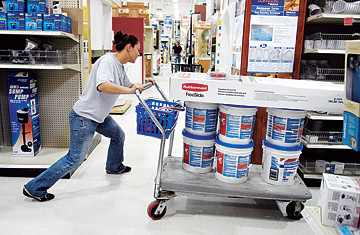
A shopper fills her cart at a Bismarck home-improvement store
It's tough to find a foreclosure sign in Bismarck, N.D. Banners announcing "Now Hiring" are much more common. Over at the mall, the Scheels sporting-goods store is so busy on weekends that some shoppers have sworn to go only during the week.
Want to make jokes about North Dakota? Sure, the state's got three times as many cattle as people, and a typical day in January is a balmy 20°F. But the folks who live here, unlike those in many other parts of the country, have jobs. And not only haven't they felt the bite of the housing-market collapse, but their houses have actually inched up in value. The recession, by and large, never made it to places like Bismarck (pop. 60,000). While the local economy is hardly bulletproof, for every bit of bad news — the Bobcat plant's summer shutdowns, say — there's more than one bit of good. How about a metrowide unemployment rate that's been dropping since February and at 3.7% is now less than half the national average?
Have lunch on the back patio of Fiesta Villa on Main Avenue and watch the railroad cars packed with coal go by — and by and by — and you'll start to understand why. Last year was a great one for energy and agriculture: corn, crude oil, coal and wheat are major state exports. The boom helped push energy outfit MDU Resources onto the Fortune 500 (the first North Dakota firm to make the list) and the state budget to a $1.2 billion surplus. State workers around the country are being told to sit at home without pay to trim costs; in North Dakota they're getting 5% raises.
At Justin Theel's car dealership, a sprawling campus on Interstate 94, the Dodges may be gone — troubles at Chrysler know no state boundaries — but sales this year are still off by only about 20 vehicles. That's a blip that dealers elsewhere would kill for. "For the most part, we're a boring story," says Theel. "But sometimes that's good."
Word has spread. The state's employment agency now fields calls from people in hard-hit cities like Phoenix and Miami who want to know how to get a job in North Dakota. Last winter, facing bleak work prospects in upstate New York, William Phillips boarded a Greyhound bus and three days later landed in Bismarck. He was shocked, he says, when the same day he applied for a job at Fireside Office Solutions, an IT-management firm, he got called in for an interview. With the city's dearth of tech-oriented workers, the company had been looking to fill the position for six weeks. He started at 8 o'clock the next morning. Says Phillips: "There's definitely not a lack of work."
Or shopping. On a Monday afternoon at the home-improvement store Menards, the parking lot is packed with pickups. It's the start of construction season, after all, and with Bismarck's population growing — not the case for North Dakota overall — there are still houses and stores to be built and remodeled. The trucks drive away with picnic tables and water heaters in their beds.
Buying, though, is different from conspicuous consumption. At the string of big-box retailers north of town, a few miles before city streets fall away and the horizon takes over, shoppers leaving Kohl's and Best Buy and Shoe Carnival are carrying bags — but not huge ones. In plenty of other places, that might be a sign of cutting back. Here in Bismarck, though, moderation is business as usual. Yes, Bismarckers like their things; it's rare to drive down a residential block and not see at least a few boats or RVs sitting in driveways. But splurging never really took hold here as it did in much of the rest of the country. Mortgage data show that the sorts of loans that landed so many home buyers in trouble elsewhere were written at a much slower pace here (in 2004, when 18% of borrowers in the U.S. were taking out subprime loans, only 6% of those in North Dakota were). "It's no secret that we're a little more conservative than the rest of the country," says John Jessen, president of Bismarck's BlackRidge Bank. "We just haven't taken a large jump outside of the box." Funny how far that can get you.
